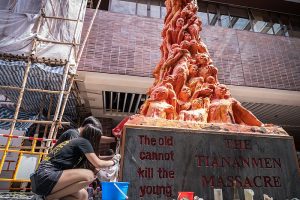A Danish artist is seeking to get back his sculpture in Hong Kong commemorating the victims of China’s 1989 Tiananmen Square crackdown as a deadline passed for its removal Wednesday.
Jens Galschioet said in an emailed statement that he had hired a lawyer and hopes he will be able to transport the sculpture out of Hong Kong “under orderly conditions and without it having suffered from any damage.”
Hong Kong University last week demanded the removal of the “Pillar of Shame” sculpture by 5 p.m. (0900 GMT) on Wednesday. No immediate action was taken as the deadline passed.
“We are still seeking legal advice and working with related parties to handle the matter in a legal and reasonable manner,” the university said in an emailed statement.
An activist group, the Hong Kong Alliance in Support of Patriotic Democratic Movements of China, released a letter Friday from lawyers representing the university that said the sculpture would be deemed abandoned if it were not taken away by the deadline.
Galschioet had loaned “Pillar of Shame” to the group, which disbanded last month amid a crackdown on political activism in the semi-autonomous city. The sculpture has been in Hong Kong for 24 years.
China’s leaders sent in the military to end pro-democracy protests in Beijing’s Tiananmen Square in 1989, killing hundreds, and possibly thousands, of people.
The ruling Communist Party has squashed any public discussion or memorializing of the events in mainland China. For years, the only major memorial on Chinese soil was an annual candlelight vigil in Hong Kong, but authorities have banned the gathering for the past two years, citing COVID-19 concerns.
Galschioet told the AP that he would prefer the sculpture remain in Hong Kong, but that as a second choice, it could be put up elsewhere until it can be brought back to the city or another site in China.
“We don’t exactly know where we should put it, but we think we have a possibility in Taiwan, we have a possibility in the United States, in Washington D.C., maybe in front of the Chinese embassy, and in Europe,” he said.
The artist said last week that it would take time to move the sculpture and expressed concern that the tight deadline set by the university meant officials intended to destroy it.
“It’s an attack against the art, and it’s an attack against the memory about the Tiananmen crackdown,” he said at the time.
The artist’s statement said his lawyer had sent a letter Tuesday requesting a hearing on the issue and that they are seeking an amicable resolution. He would not reveal the name of the law firm.
“I would like to emphasize that I consider any damage to the sculpture to be the responsibility of the university,” he wrote.

































